In AA-speak, we’ve hit bottom. The Tommyknockers is a book so universally dismissed that even I was dreading re-reading it. Word on the street is that it’s flabby, over-indulgent, the product of too much booze, too much coke, and too little editing. But dismiss The Tommyknockers at your peril. The third-best-selling book of the 1980s, it is a transcendental visionary experience.
Only The Shining has accidentally caught lightning in a bottle the way The Tommyknockers does. It’s as if King was locked in his study/sweat lodge drawing pentagrams in cocaine, drinking magic potions made of Budweiser, and automatic typing himself into a hallucinatory state. In The Tommyknockers he’s possessed by the spirit of the Great God Lovecraft—the doors of perception open, the veil parts, and the workings of the universe are revealed.
Think of King as America’s shaman, juicing himself up on mind-altering substances and stumbling out into the darkness, raving like a madman, but occasionally getting it right. He finished the first draft of The Tommyknockers in 1983, while writing The Talisman and Eye of the Dragon, and completed the last draft on May 19, 1987, about six months before the book hit shelves in November, 1987. When he was finished, King didn’t write for a year. “I would do stuff and it would fall apart like wet tissue paper,” he said in an interview. “I don’t know how to describe it, except that it’s the most impotent, nasty, awful feeling.” 1988 would be the first year in modern history without a Stephen King book.
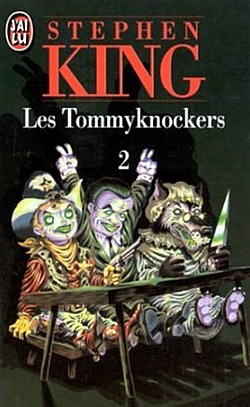 In a strange two-book deal orchestrated by his agent, Kirby McCauley, King sold the books to two different publishers for one price, $10 million: The Tommyknockers went to Putnam and Misery went to Viking. His move to Putnam was sentimental—his beloved editor, Alan Williams (editing King since The Dead Zone) was leaving Viking for Putnam and King wanted to show his support. He’d return to Viking for his next book, but it was one hell of a coup for Williams. As reviled as The Tommyknockers was (Library Journal: “Not one of King’s more original novels.” Publisher’s Weekly: “The Tommyknockers is consumed by the rambling prose of its author…”) it had a first printing of 1.2 million copies and wound up the third-best-selling book of the 1980s with 1.4 million books sold.
In a strange two-book deal orchestrated by his agent, Kirby McCauley, King sold the books to two different publishers for one price, $10 million: The Tommyknockers went to Putnam and Misery went to Viking. His move to Putnam was sentimental—his beloved editor, Alan Williams (editing King since The Dead Zone) was leaving Viking for Putnam and King wanted to show his support. He’d return to Viking for his next book, but it was one hell of a coup for Williams. As reviled as The Tommyknockers was (Library Journal: “Not one of King’s more original novels.” Publisher’s Weekly: “The Tommyknockers is consumed by the rambling prose of its author…”) it had a first printing of 1.2 million copies and wound up the third-best-selling book of the 1980s with 1.4 million books sold.
The story is relatively straightforward. Bobbi Anderson is a novelist living in backwoods Maine who has a popular series of Westerns to her name. While walking in the woods she stubs her toe on the metal edge of a buried UFO. The spacecraft radiates a malign influence transforming her into an inexhaustible genius, and she begins to excavate it. As more of it emerges, its unleashed toxic energies contaminate the nearby town of Haven, the long-dead aliens hijacking the minds of the inhabitants, turning them into a paranoid Uni-Mind given to manic bursts of bizarre mechanical creativity. Enter James Gardener, a stumblebum alcoholic poet who has hit rock bottom and seeks refuge with Bobbi, his only friend. A metal plate in his head protects him from the alien mind meld but, confronted with a force that he can’t stop, he chooses to drink himself into a stupor and watch the UFO come up out of the ground, bearing tanked witness to mankind’s first contact.
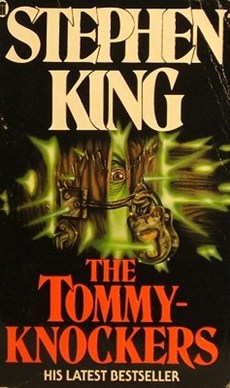 The Tommyknockers is derivative as hell. The plot is basically Nigel Kneale’s Quatermass and the Pit mixed with, as King says, H.P. Lovecraft’s “The Colour Out of Space” and there’s a funeral that owes more than a small debt to Edgar Allan Poe’s poem “The Bells.” But King is also pillaging his own books. There’s a long digression about the name of the town, much as there is in It, Derry makes an appearance, and the use of tongue twisters as a weapon is recycled. Even Pennywise the Clown is glimpsed peering out of a storm drain. Firestarter’s The Shop plays a major part in the finale, Jack from The Talisman is seen chatting on a beach, Cujo gets a shout-out, Johnny Smith from The Dead Zone comes up in coversation, and things get meta with a mention of “that guy who writes horror books with curse words up in Bangor.” He disappears completely up his own butt when a boy promises his younger brother a GI Joe action figure. Which one does he want? Crystal Ball, the GI Joe designed by Owen King in a write-in contest, and generally considered one of the lamest GI Joes of all time.
The Tommyknockers is derivative as hell. The plot is basically Nigel Kneale’s Quatermass and the Pit mixed with, as King says, H.P. Lovecraft’s “The Colour Out of Space” and there’s a funeral that owes more than a small debt to Edgar Allan Poe’s poem “The Bells.” But King is also pillaging his own books. There’s a long digression about the name of the town, much as there is in It, Derry makes an appearance, and the use of tongue twisters as a weapon is recycled. Even Pennywise the Clown is glimpsed peering out of a storm drain. Firestarter’s The Shop plays a major part in the finale, Jack from The Talisman is seen chatting on a beach, Cujo gets a shout-out, Johnny Smith from The Dead Zone comes up in coversation, and things get meta with a mention of “that guy who writes horror books with curse words up in Bangor.” He disappears completely up his own butt when a boy promises his younger brother a GI Joe action figure. Which one does he want? Crystal Ball, the GI Joe designed by Owen King in a write-in contest, and generally considered one of the lamest GI Joes of all time.
Clearly, there is a lack of editorial oversight. As King said in an interview, “Where does a 10,000-pound gorilla sit? You get all this freedom—it can lead to self-indulgence. I’ve been down that road, probably most notably with The Tommyknockers.” But it wasn’t just the lack of editors, it was the lack of sobriety. While writing The Tommyknockers King’s drinking and cocaine use were coming to a crisis. His wife, Tabitha, staged various interventions, occasionally threatening to leave, and he would placate her by stopping for a while, convinced he could scale back on his own. He couldn’t. It wasn’t until 1988 that he would deign to attend AA, and it wasn’t until 1989 that he went cold turkey.
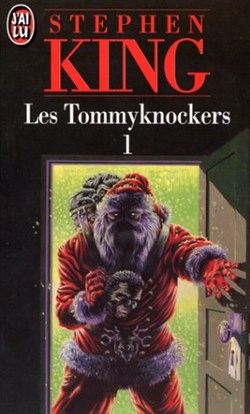 But it’s wrong to reduce King’s output to nothing more than a by-product of his substance abuse. One of his best novels, Cujo, will forever be dismissed because of his statement that he can’t remember writing it. Are Poe’s short stories and poems nothing more than side effects of his addiction? Is Dave Sim’s Cerebus, a staggering and problematic comic book achievement, nothing more than the detritus of a disordered mind? Some artistic creations transcend the circumstances of their creation, and while booze, blow, and bad faith helped lubricate King’s brain during the writing of The Tommyknockers, the book is visionary. King has described his writing as something he does in a dreaming state, almost like automatic writing, and his white hot productivity seems to put him in direct touch with his id, bypassing his internal editor, and in The Tommyknockers his doors of perception open wide and allow him to paint a nightmarish, multi-layered portrait of America, past and future.
But it’s wrong to reduce King’s output to nothing more than a by-product of his substance abuse. One of his best novels, Cujo, will forever be dismissed because of his statement that he can’t remember writing it. Are Poe’s short stories and poems nothing more than side effects of his addiction? Is Dave Sim’s Cerebus, a staggering and problematic comic book achievement, nothing more than the detritus of a disordered mind? Some artistic creations transcend the circumstances of their creation, and while booze, blow, and bad faith helped lubricate King’s brain during the writing of The Tommyknockers, the book is visionary. King has described his writing as something he does in a dreaming state, almost like automatic writing, and his white hot productivity seems to put him in direct touch with his id, bypassing his internal editor, and in The Tommyknockers his doors of perception open wide and allow him to paint a nightmarish, multi-layered portrait of America, past and future.
On its face it’s a horror story, one of King’s wildest, containing nightmare fuel imagery like Bobbi’s alien vagina eating her sister, and the lunatic machines the possessed townspeople create, a fever dream Sears catalogue of flying coke machines, laundry racks that spray fire, pickup truck-mounted death rays, dog-powered healing machines, and Bobbi’s writing machine that produces her books while she’s asleep, a feeling the hyper-productive King must have been familiar with. This will, in fact, mark the third time King has written about a magical writing machine (“Ballad of the Flexible Bullet,” “Word Processor of the Gods”).
Dig down a layer, and it’s about addiction, but not just King’s addiction. His tortured, twitching brain gives us an entire culture locked in the sweaty, herky jerky rhythms of addiction. Bobbi lapses into blackouts during which she’s incredibly productive, just like King, but that are burning her out, like a junkie. Just like King. When Gardener sees her for the first time in the book, King writes:
Bobbi was coming towards him….her face was gaunt, her eyes deep in her sockets, her forehead pale and somehow too wide…Her shirt was buttoned wrong. The fly of her jeans was three-quarters of the way down. She smelled dirty and sweaty and…well, as if she might have had an accident in her pants…
“Fine!” this shambling, dirty, stumbling skeleton reiterated. “Thought you’d given up on me! Good to see you man!…A lot of stuff going on…a lot of work done, a hell of a lot more left to do but I’m getting there, getting there…”
And she fell forward semiconscious into Gardener’s arms.
She lies to Gardener, as addicts do. She lies about what’s happening to her body, about the death of her much-loved dog, Peter, and most importantly, about the Tommyknocker that possesses her. “It won’t do anything to me I don’t want it to,” she says, like an alcoholic who thinks she’s got the bottle when the bottle has got her. Gardener thinks:
Tell me, Bobbi, did you want to work until you dropped? Did you want to lose so much weight that you looked like an anorexic? Did you drive, or were you driven?
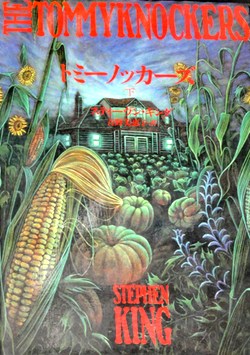 The book is driven, thick with paranoia and rambling like a day trader on a coke binge, grinding its jaw and going on and on and on. The point-of-view flips from character to character like someone with ADD and a remote control, never settling long enough to become comfortable, deflating its own narrative drive every time it switches. As Haven is taken over by the Tommyknockers, its hyperactive, emaciated residents lose their hair and teeth. These over-productive skeletons hide, building secret killing machines, murdering outsiders who stumble into their town, their minds warping, possessed of a sly secrecy. Haven is the bleakest side of the rural America to come, everyone addicted to meth, obsessed with pointless gadgets, starving to death, under the influence of a giant, malignant force that has wiped out local industry and harnessed everyone to its own needs. The Wal-Martknockers, maybe.
The book is driven, thick with paranoia and rambling like a day trader on a coke binge, grinding its jaw and going on and on and on. The point-of-view flips from character to character like someone with ADD and a remote control, never settling long enough to become comfortable, deflating its own narrative drive every time it switches. As Haven is taken over by the Tommyknockers, its hyperactive, emaciated residents lose their hair and teeth. These over-productive skeletons hide, building secret killing machines, murdering outsiders who stumble into their town, their minds warping, possessed of a sly secrecy. Haven is the bleakest side of the rural America to come, everyone addicted to meth, obsessed with pointless gadgets, starving to death, under the influence of a giant, malignant force that has wiped out local industry and harnessed everyone to its own needs. The Wal-Martknockers, maybe.
While King was working on The Tommyknockers, his close friend and first reader, Everett McCutcheon, died after a long battle with leukemia. The sickly green glow of the Tommyknockers that suffuses the book, the hair loss, the weight loss, the loss of bowel control, it’s a book that paints a portrait of an irradiated populace dying of cancer. Energy is an obsession. Gardener is fixated on the dangers of nuclear power, and an argument over reactor core meltdowns and mutated babies are what lost him his last job, and it’s a small hop from there to the seemingly omnipotent Tommyknockers who promise cheap, plentiful power for everyone at the expense of a sickening of the spirit, a loss of humanity, and a cancer-ridden body.
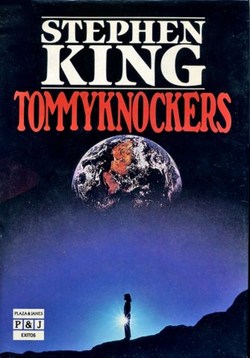 The image of an alien God, dead inside his UFO, crashed into an America hungry for cheap energy, is a powerful one, and King fast forwards through a bloody, paranoid version of American history: Native Americans, the coming of the white man, UFO scares, Area 51, the men in black, mind control signals, Three Mile Island. It’s a fever dream of a tumor-ridden nation, addicted to its pointless toys, attention spans fragmented, bodies falling apart, brains burning out like light bulbs, everyone rushing after useless prizes, losing their individuality in the face of rising groupthink.
The image of an alien God, dead inside his UFO, crashed into an America hungry for cheap energy, is a powerful one, and King fast forwards through a bloody, paranoid version of American history: Native Americans, the coming of the white man, UFO scares, Area 51, the men in black, mind control signals, Three Mile Island. It’s a fever dream of a tumor-ridden nation, addicted to its pointless toys, attention spans fragmented, bodies falling apart, brains burning out like light bulbs, everyone rushing after useless prizes, losing their individuality in the face of rising groupthink.
King says of The Tommyknockers:
“It just went on and on. It was a hard one to write, to keep track of all those people in the story. When I finished the first draft, it looked like the Bataan Death March, with lots of cross-outs and stuff. I locked myself in the bathroom and laughed hysterically and cried and then laughed again. I never did that with a book.”
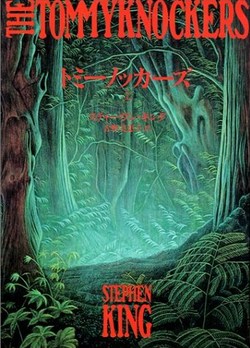 The drugs, the excessive length, the lack of control, the derivative plot, all of these are necessary evils as King tuned through the static and received these messages from…somewhere? It’s a harrowing account of his own addiction, a book about the curse of his own prolific output, a book about national addictions, a book about cancer, a book about the future, a book about our hunger for cheap energy, a book about our hunger for productivity, a book about our hunger to belong, a book about our hunger for transcendence, a book about our hunger for hunger.
The drugs, the excessive length, the lack of control, the derivative plot, all of these are necessary evils as King tuned through the static and received these messages from…somewhere? It’s a harrowing account of his own addiction, a book about the curse of his own prolific output, a book about national addictions, a book about cancer, a book about the future, a book about our hunger for cheap energy, a book about our hunger for productivity, a book about our hunger to belong, a book about our hunger for transcendence, a book about our hunger for hunger.
Out of control, full of crashing humiliations and soaring insights, The Tommyknockers veers all over the place like a DUI in the seconds before he runs off the road, but it goes faster and further than a lot of King’s more polished books. It burnt him out, but he went up in a green mushroom cloud of hallucinatory prose, not with a whimper. For better or worse, he’d never write like this again.
Grady Hendrix is the author of Satan Loves You, Occupy Space, and he’s the co-author of Dirt Candy: A Cookbook, the first graphic novel cookbook. He’s written for publications ranging from Playboy to World Literature Today and his story, “Mofongo Knows” appears in the anthology, The Mad Scientist’s Guide to World Domination.










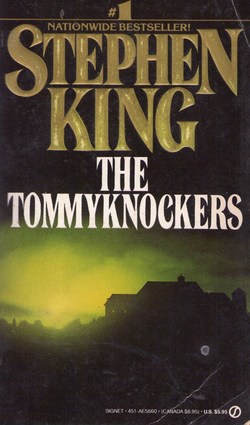
Very enjoyable and fair review. I was baffled by this novel when it first came out and wasn’t sure if I’d enjoy it on re-read. But I found myself really swept along with it all. It’s a hell of a book. If someone nominated it as American novel of the 1980s, I’d love to read that argument, as I think it credibly can be made.
It works as just lunatic sci-fi, unhinged and indulgent, or as an ideographic history of late twentieth-century background
gadgetry, from the batteries and their “molecular decomposition technology” to the Coke machine (unconscious or conscious choice, that?) and Simon and just all of that disposable-tech that collected in the corners of countless American households in the pre-internet age.
“They would begin the dance of untruth. The becoming would demand many lies.”
So many King’s works end with the town consumed in some storm or giant explosion. But I love the image of Jim Gardner, flattened and bleeding, speeding towards Altair-4, having escaped both the Tommyknockers and the Dallas Police. Kind of a 70s ending in 80s clothes.
Glad to see it given a good shake here. It’s too often dismissed for its obvious indulgences rather than appreciated for its abundant pleasures.
I’ve read this once, when it first came out. I remember virtually nothing about it, except that there were aliens. What I do remember is that once I started, I absolutely positively could not stop until I got to the end. Why I’ve never re-read it, then, is a mystery.
Blind Guardian had an album based around a number of fictional books / worlds, and Tommyknockers was the basis of one song. Loved it. :)
The one and only time I’ve read this one was in high school, about 20 years ago. I remember enjoying the first 200 and the last 100 pages of the book. But the middle took the wind out of the book’s sails. If King had found a way to work the stuff with the other people that lived in the town into the main narrative, I would have liked it much more. It felt like a good novel with a bunch of almost pointless short stories inserted into the middle.
I still find myself hearing “Late last night and the night before…”
I remember the similarity to a 1970s ABC movie-of-the-week, in which James Franciscus has a plate in his head so that he wasn’t hypnotized by the aliens (everyone else in town was, repairing a ship or something). I’m honestly surpised no lawsuits were ever filed.
http://en.wikipedia.org/wiki/Night_Slaves
From the deep history of America’s Finest News Source:
http://www.theonion.com/articles/i-dont-even-remember-writing-the-tommyknockers,10929/
“The Flexible Ballad“?
Typo, I think.
I never understood the almost universal disdain for this. Granted, I haven’t read it in a very long time, but I remember it very fondly. There are scenes that stick in my memory as vividly as those from IT, The Stand, or Pet Semetary (which started it all for me).
I would argue, however, that he’d go on to write one last book like this – Needful Things. In an era where he was deliberately shifting towards a more personal, less supernatural horror with Misery, Gerald’s Game, and Dolores Claiborne, this was one of the books that kept my love for King well-kindled.
Magentawolf…nice to see someone else listening to Blind Guardian. They also have a few songs about his Dark Tower series (Somewhere Far Beyond) as well as the singer’s side band Demons and Wizards having a bunch of tunes based on the Dark Tower. This book…I don’t know. It took me a while to get to this book and it was only after I had read and reread the first four Dark Tower novels, Gerald’s Game, Deloris Clayborn and a few others that I got to it. I had only seen bits and pieces of the Mini Series starting Jimmy Smits and Marge Helgenburger. Within this book are a bunch of potentially cool short stories and a lot of good ideas; they just don’t hold up together and as a whole and it comes off as kind of stupid at times. When I was done, I honestly didn’t know what to think. The book was long and seemed to take as much out of me as it did King when he wrote it. I didn’t read any more of his work for over a year (an eternity for an avid read, as most of you probably know).